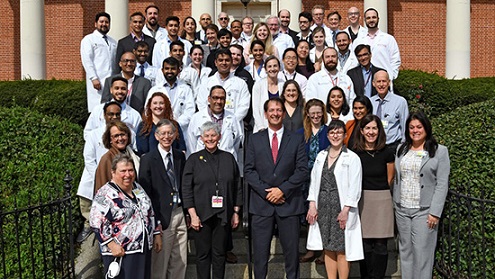Neurology Residency
The University of Maryland's neurology residency is designed to produce neurologists with a broad knowledge base that will allow them to provide excellent care to patients and succeed in any of the numerous career types available in neurology.
To accomplish this, we strive to provide our trainees with exposure to and training in the entire spectrum of neurologic disorders and to provide a depth of knowledge within disorders that encompasses the pathophysiology of neurologic disease processes through diagnosis and state-of-the-art treatment options.
With the rapid pace of medical advancements, it is more important than ever to instill in our trainees the habits of lifelong learning so that they will continue to be excellent neurologists throughout their careers.
In addition to the broad clinical training, there are numerous opportunities for elective and subspecialty experiences to develop expertise in clinical and neuroscience research.
The Neurology Residency Training Program at the University of Maryland Medical Center is fully accredited by the Accreditation Council for Graduate Medical Education. The program recently expanded to accept seven residents per class into our Categorical neurology program (starts at PGY-1). Learn more about how to apply.
Learn more about our program in letters from our program directors and from our chief residents.
To learn more about the program or if you have any questions, please contact our Education Office at NeuroEducation@som.umaryland.edu.
Mission Statement
The mission of the neurology residency program is to deliver superior health care to the Baltimore community and to patients from diverse socioeconomic backgrounds who are transferred to our center from throughout the state and the nation. Moreover, it is to train the next generation of neurologists so that they complete residency with the skills necessary to be successful in the broad range of careers available in neurology.
The University of Maryland Department of Neurology

Neurosciences has a long history of clinical and research excellence at the University of Maryland.
The Department of Neurology was founded in 1964 and continues to be a leading institute for neurology care and research.
In addition to clinical and research excellence, the department promotes a collegial and inclusive environment in which to train and practice.
Learn More:
- Department of Neurology at the University of Maryland School of Medicine
- Neurology Services provided at University of Maryland Medical Center
University of Maryland School of Medicine
The University of Maryland School of Medicine was founded in 1807 as the fifth medical school established in the United States and was the first medical school to build its own hospital for clinical instruction.
The Baltimore Infirmary, the forerunner of University Hospital and the University of Maryland Medical System, was opened in 1823. Located in downtown Baltimore, the 32-acre campus of the University of Maryland Baltimore is shared by the schools of dentistry, law, medicine, nursing, pharmacy, and social work, and the graduate school. All UMMC neurology attending physicians are faculty at the University of Maryland School of Medicine.
University of Maryland Medical Center
The new University of Maryland Medical Center hospital, is the centerpiece of the 13-hospital University of Maryland Medical System. These hospitals create a presence felt throughout the state, with tertiary referrals directed to the University of Maryland Medical Center.
Combined with the Frank C. Bressler Research Building, the Medical School Teaching Facility, the Biomedical Research Facility, the Health Sciences Facility, the Baltimore Veterans Administration Medical Center and the new state-of-the-art William Donald Schaefer Rehabilitation Center at The University of Maryland Rehabilitation & Orthopaedics Institute, UMMC forms an extensive network of clinical, research and teaching facilities.


